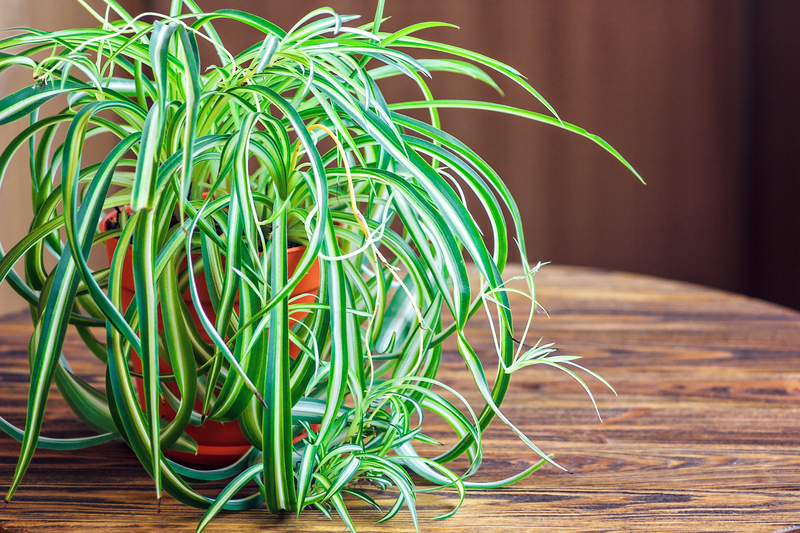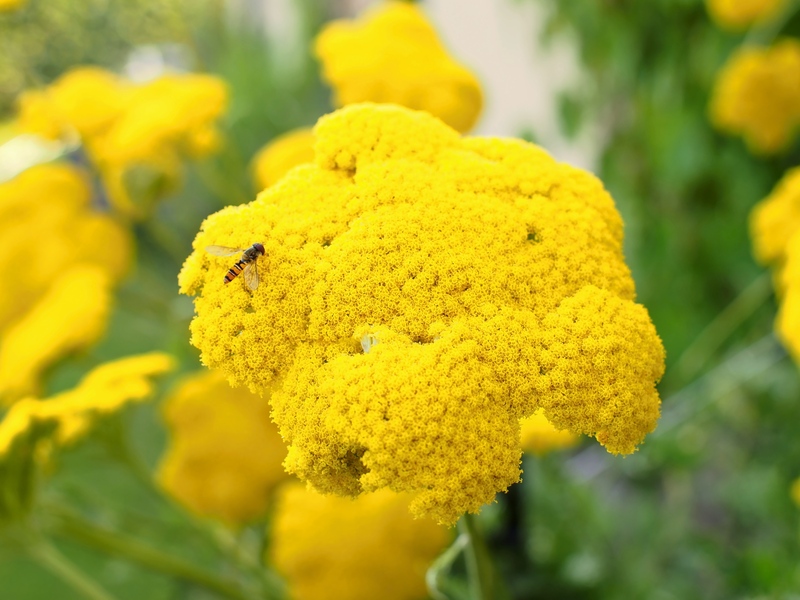Perfect Privacy Plants: 9 Hedge Species to Consider
Posted on 19/05/2025
Perfect Privacy Plants: 9 Hedge Species to Consider for Your Landscape
Are you searching for the ideal privacy plants to establish a lush living barrier around your property? Whether you want to block unwanted views, reduce noise, or add aesthetic value, hedges are a timeless solution for creating natural privacy screens. In this comprehensive guide, we'll explore nine outstanding hedge species to consider for your garden, discussing their unique characteristics, growth requirements, and tips for maintenance.

Why Choose Hedge Plants for Privacy?
With urban living on the rise, maintaining a sense of seclusion and tranquility at home is more important than ever. Privacy hedges offer a living alternative to traditional fences and walls. They're not only functional but also environmentally beneficial, fostering biodiversity, filtering pollutants, and providing habitat for birds and pollinators.
- Aesthetic appeal: Hedges bring a structured, vibrant green look to landscapes.
- Year-round privacy: Many hedge species are evergreen, keeping your space screened all year long.
- Noise reduction: Dense foliage muffles sound, creating a peaceful environment.
- Windbreak: Hedge plants reduce wind impact, protecting delicate garden beds and outdoor spaces.
- Biodiversity: Living fences attract beneficial wildlife and promote a healthier ecosystem.
Now, let's dive into the best privacy hedge species for gardens and yards.
9 Best Hedge Species to Ensure Privacy
1. Arborvitae (Thuja spp.)
Arborvitae stands as one of the most popular privacy hedges in North America. Recognized for its dense, evergreen foliage and upright growth, this plant provides an immediate concealment solution for homeowners.
- Growth rate: Fast-growing; some varieties can grow up to 3 feet per year.
- Height: Depending on the variety, mature height ranges from 10 to 40 feet.
- Sunlight: Full sun to partial shade.
- Soil type: Tolerant of a variety of soils, but prefers moist, well-drained locations.
- Popular variety: 'Green Giant' for fast, reliable privacy screens.
Tip: Space Thuja Green Giant 5-6 feet apart for a solid, seamless hedge.
2. Boxwood (Buxus sempervirens)
When it comes to formal garden design, boxwood hedges are a classic choice. Their small, dark green leaves and slow, compact growth create tidy, elegant borders suitable for both privacy and topiary art.
- Growth rate: Slow to moderate.
- Mature height: Typically up to 6 feet, but can be maintained at lower heights.
- Sunlight: Partial to full sun.
- Maintenance: Occasional trimming to keep a neat appearance.
- Durability: Drought-tolerant once established.
Boxwoods can be shaped into formal hedges or left natural for a softer look, making them extremely versatile privacy hedge plants.
3. Privet (Ligustrum spp.)
Privet hedges are favored for their fast growth and dense foliage, ideal for homeowners who want quick results in their quest for seclusion.
- Growth rate: Rapid; some can gain several feet per year.
- Height: Ranges from 4 to 15 feet, depending on species.
- Sunlight: Adaptable to sun or shade.
- Flowering: Produces fragrant white blossoms in summer.
- Soil: Thrives in varied soil types, preferring well-drained earth.
Advice: Regular trimming will ensure a tidy, dense screen and prevent unwanted spreading.
4. Laurel (Prunus laurocerasus)
For a bold and lush privacy screen, laurel hedges are hard to beat. Their glossy, broad leaves create a thick, vibrant barrier that stands up well to pollution and harsh winter conditions.
- Growth rate: Fast-growing and robust.
- Mature height: Up to 15 feet or more, if left unpruned.
- Sunlight: Prefers full sun but tolerates shade.
- Soil: Moist, fertile, well-drained soils are best.
- Benefits: Evergreen, windproof, and tolerant of urban conditions.
With minimal care, cherry laurel provides a green wall even in challenging environments.
5. Yew (Taxus baccata)
Yew hedges are renowned for their longevity and deep, rich green needles, creating dense privacy screens that last for generations.
- Growth rate: Moderate, but yews are extremely long-lived.
- Mature height: Varies between 10 and 20 feet, but can be trimmed to size.
- Sunlight: Grows in sun or deep shade, offering versatility.
- Maintenance: Responds well to pruning for neat, formal hedges.
- Allergy note: All parts are toxic if ingested, so avoid planting near children's play areas.
Tip: Yews are one of the best privacy plants for shaded locations.
6. Bamboo (Phyllostachys spp. or Fargesia spp.)
If you're in need of a dramatic, exotic privacy plant option, consider bamboo hedges. Fast-growing and impressive, certain non-invasive clumping varieties can provide instant seclusion without becoming a nuisance.
- Growth rate: Exceptionally fast - up to several feet per year.
- Mature height: Ranges from 10 to 30+ feet, depending on species.
- Sunlight: Prefers full to partial sun.
- Varieties: Choose clumping bamboos to avoid invasive spread (e.g., Fargesia).
- Maintenance: Regular thinning and removal of old canes is essential.
Bamboo provides excellent wind and noise screening for outdoor privacy in both urban and rural settings.
7. Photinia (Photinia x fraseri 'Red Robin')
For a vibrant touch of color, Photinia hedges display fresh red growth in spring that gradually matures to glossy green. They're both decorative and functionally dense.
- Growth rate: Quick, with a bushy, upright habit.
- Height: Up to 10 feet, but easily trimmed to desired size.
- Sunlight: Prefers full sun, but tolerates some shade.
- Pest resistance: Good resistance to common pests and diseases.
- Flowering: White blossoms in late spring.
With regular pruning, Photinia creates a thick, privacy-enhancing hedge bursting with seasonal color.
8. Holly (Ilex aquifolium)
Holly serves as a dual-purpose hedge, offering excellent privacy and yearlong visual interest with its spiny, evergreen leaves and vibrant red berries (on female plants).
- Growth rate: Slow to moderate, but very dense.
- Height: Up to 15 feet or more if unpruned.
- Sunlight: Tolerates both sun and shade.
- Wildlife: Berries attract birds, supporting garden biodiversity.
- Security: Spiny leaves deter intruders.
Holly hedges are perfect for classic gardens seeking both privacy and seasonal charm.
9. Hornbeam (Carpinus betulus)
Unlike many deciduous hedges, hornbeam holds on to its withered golden leaves through winter, delivering year-round privacy in a unique way.
- Growth rate: Fast, particularly when young.
- Height: Can reach up to 20 feet, or be clipped lower for a formal look.
- Sunlight: Full sun or partial shade.
- Maintenance: Takes well to regular pruning and shaping.
- Soil: Tolerates poor and heavy soils better than beech.
For a robust, leafy barrier that looks handsome even in winter, hornbeam hedges are a top choice.
How to Choose the Best Privacy Plants for Your Space
Selecting the perfect hedge species for privacy starts with assessing your unique needs and site conditions.
- Climate: Choose species suited to your hardiness zone and temperature extremes.
- Growth rate preferences: Need privacy fast? Opt for fast-growing hedges like arborvitae or privet.
- Size limitation: Ensure mature height and width fit your available space.
- Evergreen vs. deciduous: Evergreens offer year-round privacy, while deciduous can provide seasonal charm.
- Allergies and pets: Avoid toxic species if pets and children use the garden.
- Maintenance: Be realistic about the amount of pruning and care you can provide.
Pro tip: Combining different hedge species can create textural and seasonal interest, enhance wildlife value, and minimize pest issues.
Maintenance Tips for Healthy Privacy Hedges
To ensure your privacy hedge thrives for years, follow these essential care strategies:
- Soil preparation: Before planting, enrich soil with compost or organic matter.
- Watering: New hedges require regular watering--especially during the first two seasons.
- Pruning: Trim regularly to maintain shape and encourage denser growth.
- Mulching: Apply mulch to retain moisture and suppress weeds.
- Feeding: Fertilize annually in the spring for robust, green growth.
- Pest management: Monitor for signs of disease or insect infestation and address quickly.
Expert advice: The best time to plant most privacy hedge plants is in early spring or autumn when soil moisture is abundant and temperatures are moderate.

Frequently Asked Questions about Privacy Hedge Plants
What is the fastest growing privacy hedge?
Arborvitae, privet, and laurel hedges are some of the quickest options for implementing an effective privacy solution. Certain bamboo species also deliver extremely rapid coverage, but always select clumping varieties to avoid invasive spread.
Which privacy hedge is lowest maintenance?
Boxwood and some types of holly require little attention once established, thriving for years with only a once or twice yearly trim. These species are ideal for busy gardeners who want a classic look with less effort required.
Can I mix different types of privacy hedges?
Absolutely! Mixing various privacy plant species can yield attractive, layered hedges that offer seasonal flowers, berries, and enhanced resilience against pests or disease.
Are there privacy hedges suitable for small gardens?
Yes! Boxwood, photinia, and compact varieties of holly can be easily maintained at a lower height and hedge width, making them well suited for limited spaces.
Conclusion: Your Path to a Perfect Green Privacy Barrier
With a thoughtful selection of these 9 perfect privacy plant species, you can enjoy a beautiful, functional hedge that meets your privacy needs for years to come. Whether you favor the lush look of laurel, the classic tidiness of boxwood, or the showy red leaves of photinia, there is a hedge species for every landscape. Remember to consider growth rate, evergreen vs. deciduous, and maintenance needs when planning your living privacy fence.
Investing in privacy hedges means:
- Enhanced property value
- Improved aesthetics and curb appeal
- Eco-friendly living barriers
- Year-round enjoyment of your outdoor sanctuary
Start planning your ideal privacy hedge today and transform your garden into a secluded paradise!
Keywords: privacy plants, hedge species, best privacy hedges, living privacy screens, privacy plant options, lush hedge plant, evergreen hedge, backyard privacy plants
Latest Posts
Green Walls and Vertical Gardens: Beauty Reimagined
Recycling Organics into Lush, Growing Soil
The Magical World of Herb Gardening

